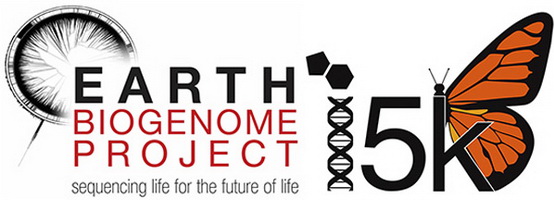
Earth BioGenome Project Holds Solutions for Agriculture's Future
April 25, 2018| |
The U.S. Department of Agriculture (USDA) has partnered with the Earth BioGenome Project (EBP) in an effort that will yield millions of powerful new solutions to agriculture's challenges. EBP is an international cooperative initiative to sequence in the next 10 years the DNA of more than 1.5 million species—those more complex than bacteria—representing the world's biodiversity.
EBP is calling scientists to sequence the genomes of 9,330 species, one of each plant, animal, and protozoan taxonomic family as reference genomes in the first three years. In years four to seven, the plan calls for sequencing the genome of one species from each genus—the next taxonomic division finer than family for a total of about 150,000 genera. The remaining 1.5 million species would be sequenced in the final four years of the project. So far, scientists from around the world, individually and in various networks, have sequenced the genomes of about 15,000 species, less than 0.1 percent of all life on Earth.
"The benefits that will come from increasing our knowledge and understanding of the genomes of the Earth's biodiversity will be monumental, especially for agriculture," explained Kevin Hackett, senior national program leader for entomology with USDA's Agricultural Research Service (ARS). Hackett is one of only three federal members on the 23-person EBP steering committee, representing agriculture. As an example of the importance of the project to agriculture, Hackett pointed out that insects destroy one-fifth of the world's crop production annually and would do worse without pesticides. Control of insect devastation is an ongoing struggle, and pesticide resistance is an ever-evolving problem, requiring researchers to look constantly for new ways to tackle the issue.

For more details, read the research news from USDA ARS.
| |
Biotech Updates is a weekly newsletter of ISAAA, a not-for-profit organization. It is distributed for free to over 22,000 subscribers worldwide to inform them about the key developments in biosciences, especially in biotechnology. Your support will help us in our mission to feed the world with knowledge. You can help by donating as little as $10.
-
See more articles:
-
News from Around the World
- FAO Calls for Global Coordination for a Bioeconomy that Leaves No One Behind
- CIMMYT Scientist Uses Native Maize Varieties to Find Novel Traits for Breeding
- A Scientist Works to Increase Water Saving Potential of Crops
- Earth BioGenome Project Holds Solutions for Agriculture's Future
- Agri-Biotech Project Featured in Farm Tourism Field Immersion in PH
- Fostering Innovation Key for a Healthy, Wealthy and Food-secure Commonwealth
- EuropaBio: EU Must Reinstate Science in GMO Safety Assessment; Stop Unneeded Animal Testing
- EFSA Publishes Scientific Opinion on Three‐Event Stack Cotton GHB614 × LLCotton25 × MON 15985
-
Research Highlights
- Why Rice Planthoppers Do Not Prefer Bt Rice Plants
- Transformation of Encoded GA20-oxidase Gene in Tobacco
- OsPK2 Gene Involved in Starch Synthesis and Grain Filling in Rice
-
Beyond Crop Biotech
- Research Team Creates Detailed Map of Genetic Evolution of Brewer's Yeast
- Scientists Develop Insulin-Deficient Pigs for Diabetes Research
-
Announcements
- 2018 BIO International Convention
-
Plant
- Dominant Allele Restricts Nodulation of Rhizobium Species in Soybean
- Researchers Perform Targeted Mutation and Gene Replacement in Tomato
- Application of CRISPR-Cas9 Genome Editing in Wild Strawberry
- CRISPR Reveals the Role of SlMPK20 Protein in Tomato Pollen Development
-
Read the latest: - Biotech Updates (December 10, 2025)
- Gene Editing Supplement (November 26, 2025)
- Gene Drive Supplement (February 22, 2023)
-
Subscribe to BU: - Share
- Tweet
